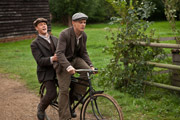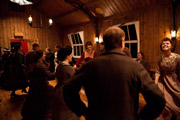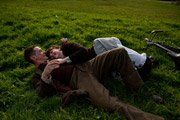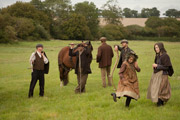Michael Morpurgo interview transcript
One of the important things about the beginnings of 'Private Peaceful' is that it's set in a community that I know really well.
The place where I live is called Iddesleigh, a little village in deepest Devon, and you couldn't get any deeper, I mean it has a 100 or so inhabitants, I don't know, 40/50 houses, a church, a pub, a school that was and isn't any more. That's it. And all round people do what they always did, they farm. And the history of this farming is in the graveyard. And you can see the uncles and the aunts and the grandfathers and grandmothers of all the people that I know, and you can see how long they lived, which in many cases was not very long.
Their lives were very hard, and they were very often very brief. And the houses which are now renovated, and we have some heating and we have electricity and things like that, it is not difficult to imagine how it would have been really a few decades ago. And the other thing that's not difficult is how the social class was rigid then.
We run a project, my wife Claire and myself, called Farms For City Children, and just in a huge Victorian house just outside the village. I won't go in to what the project is, it doesn't matter for this, but this big house where the kids now live when they come down to do their week on the farm was built in 1871, it's sort of high Victorian/imitation Jacobean, that sort of thing, but it was the old manor house of the village.
This is where the guy lived who ran the local hunt and kept his hounds, and there were the stables, and it had the servants' quarters. And the great thing about it, as far as I was concerned, is that the people who we were working with, look after the children, the lady who did the cooking and ladies who helped with the cleaning and looking after, were all under-parlour maids in another generation going back to the 30s, which isn't far from the 20s, which of course is not far from the First World War.
So I had a kind of a direct link back to how that society was, and the rigidity of it and the way, very often, that people who lived in tied cottages and worked on the land were treated.
It wasn't slavery, but there was a lot of power coming from on high. They could turf you out of your house when they felt like it, and very often did.
In fact, in our village there's a Society, and there used to be in all these communities Friendly Societies, and these Friendly Societies were only forms of agricultural unionism, it's when the workers got together, paid a little tiny bit of their weekly wages in to the kitty, and from that if you had an accident and you were put out of your house and there was no money coming in, this fund would help you and your family for a while.
They paid funeral expenses. It was some way, if you like, before there was any kind of social service support, of supporting people who lived on the land, because life was extremely hard, particularly if things went wrong, you know, if you did have health and you worked a long life and you could support your family.
But then there were restrictions, you know, who could hunt where and who could fish where. And all this is in my parish, you know, and so it was not difficulty when I was beginning Private Peaceful to begin it very deliberately in the place that I live. I know every cottage and I know every tree, I sometimes know who planted the trees. It was what Thomas Hardy referred to as the old association, it's when you associate people and the land and the history, and so I was very close to all that.





